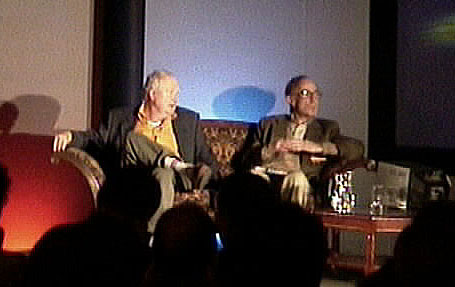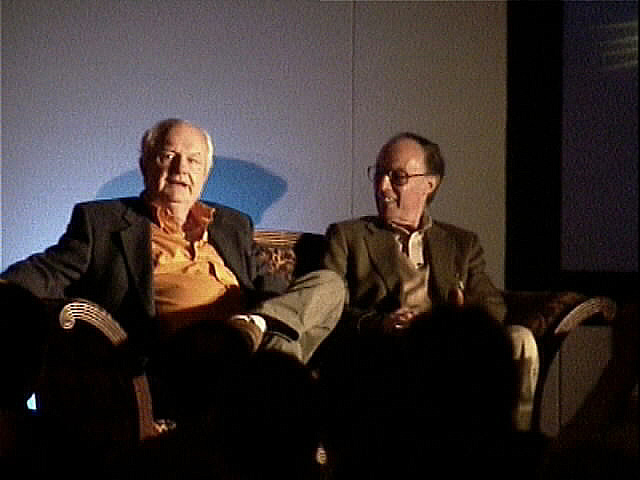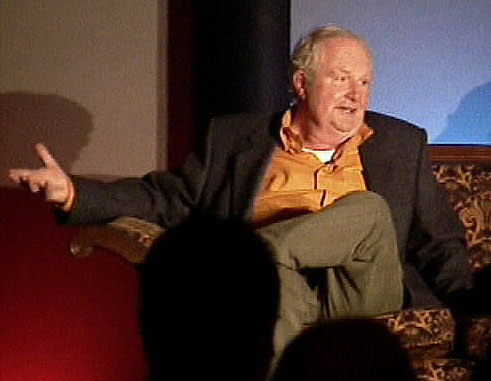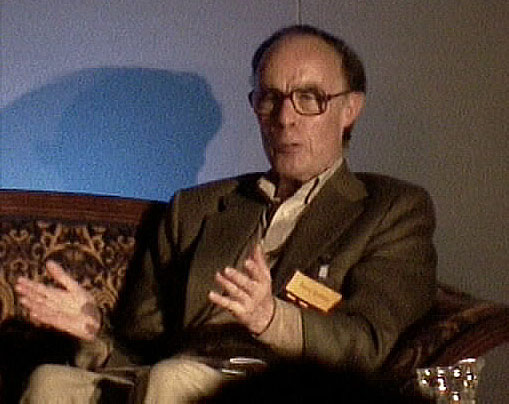During the first day of Century 21, David Graham did an interview. Mid-way through, he was joined by surprise guest Shane Rimmer. Both recollected working on Anderson productions and beyond. Transcript and photos taken from video tape.
Interviewer: Andrew Frampton
Interviewees: David Graham and Shane Rimmer.
David, Tell us of your beginning
D: Born in London, graduated during the war, served in the RAF and I always used to like to do voices. We once did a charade at school and they needed one to do Churchill. After the war I started my theatrical career.
The first job on tv was playing a waiter. It was all recorded live - you could not dry up. The BBC had a Sunday night play that they would repeat on Thursday - live again! In general, actors don't like to make mistakes, so there is some nervousness even today.
In Elstree I did a play, "Martin Cain" - a cops and robbers thing, directed by Gerry Anderson. I played a futitive. He told me "it isn't a very good script, do you think you could run over the set to cover-up for those terrible lines", so I did. We chatted between takes and I took his number. About a year later he called me and that started our association.
How do you create a character voice?
D: Well, you looked at the character and let that inspire you. Or the story board. I did see them before I did the voices for them. For Brains, there was no indication in the script that he had to stumble over his words, but it sounded natural for him.
When you get familiar with the character, you start to fill it out. Parker is a much richer character later in the series than in the first ones. When I do multiple characters in the same scene, you normally switch voice during the scene. We didn't do different takes for different characters. Of course they did not overlap in talking. There would be a second or so in between allowing you to switch over.
(Shane Rimmer makes an unannounced appearance at this point)

How long did the recordings take?
S: Well, Graham made lots of mistakes, so it look a lot longer
D: That's my boy!
S: It was almost like running a radio show. The puppeteers had to get used to our speech rhythms but they had a great knack for it. The Mars bar factory was next door to the studio so since our recordings I cannot stand Mars bars - the powerful smell was there all the time - I now eat Bounty bars. The studios were an amazing layout. Lilliput city.
D: They had these high speed Mitchell cameras for the explosion filming to make it more dramatic.
How did the change from 30 minutes to one hour episodes affect you in Thunderbirds?
D: It didn't make a difference to the characters. We just had to go with the flow. We did the extra lines from the extra scripts which they wove in with the original material. We did three scripts on one Sunday a month. We acted them out as played. If you see them, they are not condescended to - if there was tension, everyone acted it up to the full, otherwise you would not get the reality of the character.
S: The first reaction to the news of the one hour shows was "God, now we have to work for a living." With half hours, you go into that little studio and knock off at three o'clock.
D: The padding stories does help to make the characters richer.
S: It was unheard of. An animated show running for a full hour. When you start with a solid beginning, the characters were taken in by the audience.
When did you realise Thunderbirds was going to be a cult hit?
D: The reaction after the first run were so terrific, that we realised that it was something special.
S: It's a lottery really. You cannot know in advance. There are a lot of things that happen to be "right". And free Mars bars too!
David, what did you do after Thunderbirds?
D: I wasn't involved in most of the later series. I did a lot of post production voice-overs for Secret Service. I pursued my career - doing theatre, television, BBC Radio. Voice-overs for commercials, book reading and sometimes waiting for the phone to ring.

Shane, you did some uncredited work for Scarlet and Secret Service, but you also wrote scripts. How did that come about?
S: I worked with Tony Barwick and sometimes he got overloaded or had no idea for a script, so I helped out. We even wrote a book together that never got published, but we did sell the screen rights for it. Don't know what happened with that. I did a fair amount of writing for Joe 90. I liked that character.
You also did a lot of live action tv. Did your voice talents came in helpful there?
D: Yes, in Dr. Who I did Russian and foreign characters and that came in helpful. These days there are so many actors that fit any character - you don't need a voice character.
How was acting on The Persuaders?
S: Marvelous. They never knew what they were doing. One would wait, and the other would start talking. Two great performers. They kicked around but knew when to stop. The script was on the floor half the time. Nobody knew how it was going to be edited - including them. Drove the director crazy.
I wrote a script for Tony Curtis in the Protectors but he couldn't do it, so I ended up playing this Zeke character - Zeke's Blues (2nd series, episode 16).
Questions from the floor:
Would you change the characters if you had a chance?
D: I hoped I got it right first time - I'd hate to change them in any way. I'd like to do them again - in new episodes.
You both do some terrific American accents. Have you been to the States?
S: I was born there (laughter). I lived in the UK for 30 years, but I go back and forth.
D: I went to a drama school in New York (the Neighborhood Playhouse) and you mop up the accent. When I got back to Nottingham, they told me to get rid of it. Having a good ear for impressions and voices, that's how I picked it up.

Shane, how did you get a role in "Spy Who Loved Me"?
S: Just going along and meeting the director. The main characters are already set, and the other actors need to give a line and physically fit the space, melt in, to be selected. Sometimes we spent days doing nothing in a cafe because production would stop as some tv station came in to do interviews with Roger Moore. Roger puts a great deal of ease. At one point there was a big explosion that went out of control - it set fire to the set and hot pieces of paint fell down the ceiling and some people need to have plastic surgery after that. I just followed Roger and piggybacked out of the set. He someone found the quickest way out.
Can you do some phrases from your famous characters?
D: I based Gramps from Four Feather Falls on Walter Brannon, a famous actor. I did Fernando, the villain, Dr. Beeker and Mitch the Monkey (applause when he squeaks Mitch), and of course Parker.
How is it to revisit characters you did 25 years ago?
S: Weird. There was nothing calculated when we first did it. You never know when you come back to such a character. It's delightful to do them again, strange, but delightful.
D: We're both lucky, as our voice qualities did not change that much over the years. Otherwise it would have been difficult.


